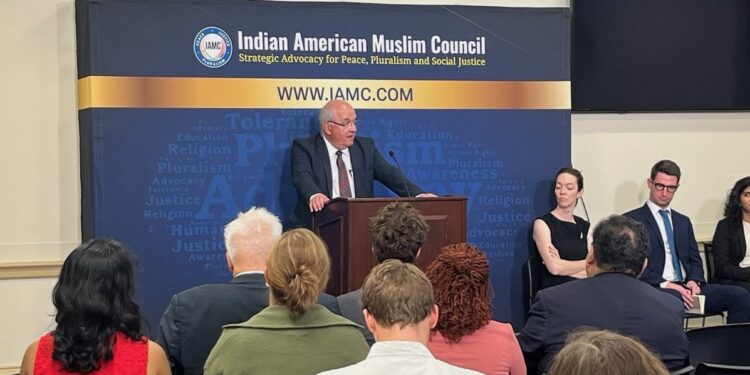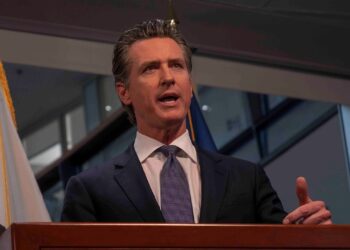A US Congressional briefing has sounded the alarm on what speakers described as a grave and escalating human rights crisis in India. The 17 July event in Washington DC spotlighted the persecution of minorities, the erosion of civil liberties, and the Indian government’s increasing use of transnational repression to target diaspora activists and critics.
The briefing was co-sponsored by ten international and interfaith organisations, including the Indian American Muslim Council, Genocide Watch, World Against Genocide, Hindus for Human Rights, New York State Council of Churches, The Religious Nationalisms Project, American Muslim Institution, Association of Indian Muslims of America, The Humanism Project, and the Center for Pluralism.
Key speakers included Professor Nicolas Levrat, UN Special Rapporteur on Minority Issues; Ed O’Donovan, Senior Adviser to the UN Special Rapporteur on Human Rights Defenders; Dr Asif Mahmood, Vice Chair of the United States Commission on International Religious Freedom (USCIRF); Annie Boyajian, President of Freedom House; and Ria Chakrabarty, Senior Policy Director at Hindus for Human Rights.
UN and US officials voice deep concern
Professor Levrat opened the briefing by drawing attention to systemic discrimination and violence against India’s religious and ethnic minorities, warning of an emerging pattern of authoritarianism and state complicity.
“We must remember that minority rights are an essential part of democracy,” Levrat said. “The trend we see in India is deeply worrying — it reflects not only political exclusion but the steady dismantling of constitutional protections.”
Echoing these concerns, Ed O’Donovan described the worsening situation for human rights defenders in India, citing a pattern of criminalisation, surveillance and arbitrary detention of activists, particularly those from marginalised communities.
“India is one of the most dangerous countries for human rights defenders today,” O’Donovan said. “Journalists, lawyers, and community organisers are targeted simply for doing their work — a key pillar of any democracy.”
“India is falling short, very short of its legal obligations. Its current government is not only failing to protect persons belonging to minorities, but creates and actively promotes conditions that deliberately targets persons belonging to minorities, putting them at risk, not only as regards their way of life, but also as regards their very life.” ~ Professor Nicolas Levrat, UN Special Rapporteur on Minority Issues
Repression beyond borders
A major focus of the briefing was the issue of transnational repression — the practice of targeting dissenters and activists abroad through surveillance, harassment, visa restrictions, and diplomatic pressure.
Dr Asif Mahmood of USCIRF said his commission had documented India’s expanding reach into the diaspora, especially following revelations of assassination plots targeting Sikh activists in the United States and Canada.
“There is clear evidence that the Indian government has attempted to silence dissent beyond its borders,” Dr Mahmood said. “Whether it is through travel bans, intimidation, or digital surveillance, this has become a global problem that undermines the safety of Indian-origin communities in democracies like the US and Australia.”
Mahmood also criticised India’s continued refusal to allow USCIRF entry to conduct investigations, calling it “a stark indication that the government does not want international scrutiny.”
Declining democratic freedoms
Annie Boyajian, President of Freedom House, placed India’s rights crisis within a broader global context of democratic backsliding, noting that the organisation had downgraded India to “Partly Free” in its annual report.
“India has experienced a marked decline in political rights and civil liberties over the past decade,” Boyajian said. “This includes crackdowns on independent media, internet shutdowns, and attacks on civil society. These are not isolated incidents — they form a consistent pattern.”
Boyajian also stressed that countries like the United States had a responsibility to speak out, particularly when democratic allies fall short on human rights.
“From majoritarianism to oligarchy to anti-democratic governance, Modi has used every tool in the authoritarian playbook to crush the spirit of Indian democracy,” ~ Ria Chakrabarty–Hindus for Human Rights
Civil society calls for international action
Ria Chakrabarty of Hindus for Human Rights gave a detailed account of India’s domestic crackdown on minorities and critics of the government, linking it to the broader ideology of Hindu nationalism promoted by the ruling Bharatiya Janata Party (BJP).
“From the revocation of Kashmir’s autonomy to the Citizenship Amendment Act and the bulldozing of Muslim homes, we are witnessing the weaponisation of law and state institutions against minorities,” Chakrabarty said. “Critics are labelled ‘anti-national’ and imprisoned under draconian laws like UAPA. The world cannot look away.”
Chakrabarty also highlighted the global impact of Hindutva-aligned diaspora groups that promote disinformation and intimidate dissenters, particularly those speaking out in Australia, the UK, and North America.
The Humanism Project, a Melbourne-based advocacy group, was one of the co-sponsors of the briefing and has previously documented how critics of Hindu nationalism in Australia have faced digital harassment, smear campaigns, and legal intimidation.
A united call for accountability
Throughout the briefing, speakers urged the US Congress and the Biden administration to take concrete policy action. This included holding hearings, enforcing human rights conditions on trade and defence agreements, and supporting international accountability mechanisms.
“The crisis in India is not simply a domestic matter,” said one organiser. “It is a test of the international community’s willingness to defend human rights wherever they are under threat.”
The Indian American Muslim Council, in its media release following the event, called for bipartisan leadership in the US to address what it described as a “slow-motion catastrophe” in the world’s largest democracy.
While India’s government has frequently dismissed criticism as foreign interference, speakers at the briefing stressed that the global community had both a moral and legal obligation to respond.
“The erosion of democracy in one country affects us all,” Professor Levrat said in closing. “We must act not only in solidarity with the people of India — but in defence of the principles we all share.”











